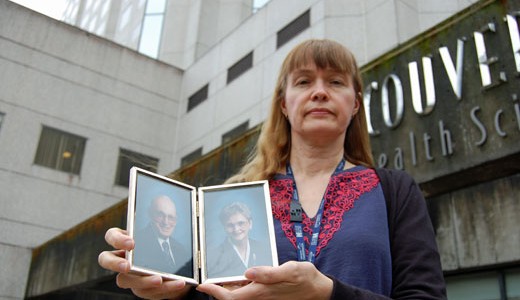How C. difficile hurt my family
A respected member of Ironworkers Local 759, Maurice Harris — my father — took pride in his contributions to many projects in Thunder Bay, Ontario. As a retiree, he and my mother Patricia led an active social life. They enjoyed going out for dinner and playing bridge with friends. They treasured spending time with their children and grandchildren.
[pullquote align=”left|center|right” textalign=”left|center|right” width=”30%”]
CDI rates are declining at VGH – read about how we did it:
- Preventing C-difficile: Acute Medicine leads the way at VGH
- CDI cases plummet across four more VGH units
- Can we prevent CDIs altogether? Yes, we can – and did!
- Look for the green tag
[/pullquote]
But everything changed when my father acquired a Clostridium difficile infection (CDI).
C. difficile is a bacterium that causes symptoms ranging from diarrhea to life-threatening inflammation of the colon. People who acquire a CDI experience watery diarrhea, abdominal tenderness and pain, loss of appetite and other symptoms particularly worrisome for those in hospital and whose health is already compromised. And, yet, all too often that’s exactly where people acquire C. difficile — in the hospital.
Hospital stay led to illness
At 80 years of age, my father had heart disease and chronic obstructive pulmonary disease (COPD). He was admitted to hospital multiple times and, nearly one year ago, he acquired a CDI while an inpatient.
My father had experienced diarrhea before, probably from his many medications, but this time it was different. The diarrhea wouldn’t stop on its own. He was prescribed Flagyl and the diarrhea got better — but it didn’t last.
My parents’ world shrank
Over the next three months my father experienced two relapses of CDI. He was hospitalized once to replace fluids and electrolytes. He was prescribed Flagyl — twice — but this antibiotic can make you feel sick, too. As a result, my father didn’t take his medication as he should have and occasionally skipped doses.
As an infection control practitioner, I know that managing CDI, along with other health issues, can be difficult for the elderly. And that was true for my father and mother. It seemed that they always had questions about CDI, the drugs, how to disinfect the bathroom, and sometimes they were at a loss to find answers.
As the sole caregiver, my mother carried the burden of disinfecting the bathroom after each use, driving my father to the hospital if he needed electrolyte replacement and caring for his other needs. She worried getting a CDI herself. If she fell ill with a CDI, too, my father would have had to be admitted to hospital.
But, perhaps worst of all, CDI made it virtually impossible for my parents to leave the house, because they never knew when the next bout of diarrhea would strike. They didn’t want friends to visit either and risk getting ill. My parents’ world shrank.
I considered fecal transplants
As time went on, my father lost weight — weight he didn’t have to lose. The persistent diarrhea interrupted meals and his sleep. He became exhausted and his stomach hurt.
After a second course of Flagyl failed to kill the infection, my father switched to oral Vancomycin. Fortunately, my parents’ health plan covered most of the drug costs to treat CDI — every family isn’t as fortunate.
My sisters and I did what we could to help our parents. It was difficult to see how much they suffered and so when my father switched to Vancomycin, I began looking into fecal transplants just in case the new antibiotic didn’t work. Also known as fecal bacteriotherapy, fecal transplants involve placing healthy fecal matter into the recipient by an enema. The procedure isn’t offered by the local health care where my parents lived, and so I was looking into how I could do this safely in a home setting.
Fortunately, Vancomycin cleared my father’s infection. I didn’t have to travel back to Ontario and conduct a transplant, but the CDI robbed my parents of precious time and their quality of life.
On December 8, 2012, at the age of 81, my father passed away. His death is not attributable to his experience with CDI, but the infection added unnecessary suffering and stress to my parents’ final year together.
We can stop the suffering
My father didn’t need to suffer and neither do our patients. We can prevent hospital-acquired CDIs, starting with proper hand hygiene. And, we’ll continue making a difference through our CDI Initiative. By focusing on quality in all we do — because we care — I believe we’ll spare our patients, families and friends from needless pain and suffering. I hope you support our efforts.

